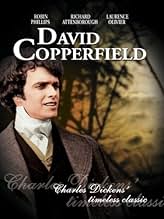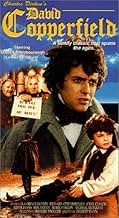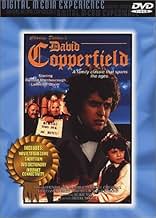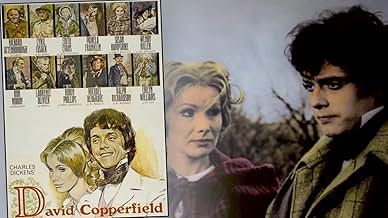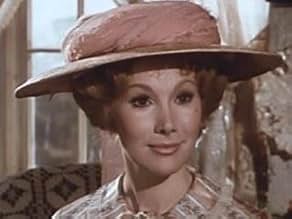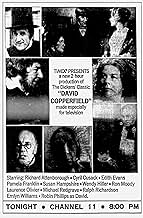Füge eine Handlung in deiner Sprache hinzuThe legendary novel by Charles Dickens comes to life in this colorful interpretation directed by Delbert Mann.The legendary novel by Charles Dickens comes to life in this colorful interpretation directed by Delbert Mann.The legendary novel by Charles Dickens comes to life in this colorful interpretation directed by Delbert Mann.
- Regie
- Drehbuch
- Hauptbesetzung
- Für 3 Primetime Emmys nominiert
- 4 Nominierungen insgesamt
Empfohlene Bewertungen
Director Delbert Mann was a much better director than this film indicates. He directed ALL QUIET ON THE WESTERN FRONT, THAT TOUCH OF MINK, and THE LAST DAYS OF PATTON among others. This mediocre, made for television retelling of Dicken's masterpiece is so bad, even those unfamiliar with the often filmed tale, will be unsatisfied.
Besides the fact that the movie is available from only two known suppliers (Brentwood and BCI Eclipse LLC) the poor quality of the transfer, and the scratchy and muddied sound track make the task of finding this film on video not worth the effort.
I have always believed that if a company is going to put a film on video and charge the public money to buy it, then they should at least have a descent copy of the film and do a good job on the transfer. Unfortunately neither of the two suppliers have such a work ethic and the result is only fit for the bargain bin in the local discount store.
The story is told mainly through flashbacks, making the film episodic and talky. Much of the rich detail of the novel is lost in this translation. The characters of Martha, Traddles and others have been cut and the relationship of young David and Steerforth is not explored enough, so we are left wondering why David would hang out with the guy.
The relationship between David the boy, and young Agnes is never developed and it is hard to understand why she and David eventually marry. Since Martha is left out, it is a mystery how Dan Peggoty finds his niece. And the absence of Traddles makes David a very lonely fellow.
Some have credited this film with doing a good job of abridging the lengthy novel. I disagree, this is at best a hatchet job on the book. Anyone who has seen the 1935 George Cukor version will agree.
The performances in that version by Fields as Micawber and Rathbone as Murdstone, are definitely worth the trouble of watching it. And the more recent Masterpiece Theatre version (April 2000) and Hallmark (2000) versions are both outstanding achievements in made for television adaptations of classic novels. Directors Simon Curtis and Peter Medak who are responsible for those films are deserving of the highest praise.
My final comment on David COPPERFIELD 1969 is Don't buy it, there are several much better versions of the film available. If it is on television, turn the channel to something else. It is a waste of one hour and twenty minutes of your life. Sorry folks, but I can't praise such an appallingly bad film.
Besides the fact that the movie is available from only two known suppliers (Brentwood and BCI Eclipse LLC) the poor quality of the transfer, and the scratchy and muddied sound track make the task of finding this film on video not worth the effort.
I have always believed that if a company is going to put a film on video and charge the public money to buy it, then they should at least have a descent copy of the film and do a good job on the transfer. Unfortunately neither of the two suppliers have such a work ethic and the result is only fit for the bargain bin in the local discount store.
The story is told mainly through flashbacks, making the film episodic and talky. Much of the rich detail of the novel is lost in this translation. The characters of Martha, Traddles and others have been cut and the relationship of young David and Steerforth is not explored enough, so we are left wondering why David would hang out with the guy.
The relationship between David the boy, and young Agnes is never developed and it is hard to understand why she and David eventually marry. Since Martha is left out, it is a mystery how Dan Peggoty finds his niece. And the absence of Traddles makes David a very lonely fellow.
Some have credited this film with doing a good job of abridging the lengthy novel. I disagree, this is at best a hatchet job on the book. Anyone who has seen the 1935 George Cukor version will agree.
The performances in that version by Fields as Micawber and Rathbone as Murdstone, are definitely worth the trouble of watching it. And the more recent Masterpiece Theatre version (April 2000) and Hallmark (2000) versions are both outstanding achievements in made for television adaptations of classic novels. Directors Simon Curtis and Peter Medak who are responsible for those films are deserving of the highest praise.
My final comment on David COPPERFIELD 1969 is Don't buy it, there are several much better versions of the film available. If it is on television, turn the channel to something else. It is a waste of one hour and twenty minutes of your life. Sorry folks, but I can't praise such an appallingly bad film.
Delbert Mann's TV movie of David Copperfield is unique among film adaptations in that it tells the entire story from a series of flashbacks rather than an ongoing narrative. It works extremely well, adds to the emotional punch of the entire story, further illuminates Dickens' wonderful characters and is aided by a haunting musical score by composer Malcolm Arnold.
It also boasts a pretty fabulous cast including Dame Edith Evans, Susan Hampshire, Richard Attenborough, Ron Moody, Wendy Hiller, Lawrence Olivier and Sir Ralph Richardson; a veritable who's who of the finest British actors of the 20th century! Some have commented that Robin Phillips is bland as the title character. I couldn't disagree more. He is certainly the most cerebral, tortured David in any of the adaptations and also cuts a handsome figure in the movie. In short, he's splendid.
Now to the currently available DVD quality. I certainly agree that it is not good. The colors are a bit washed out, there is some clipped editing and a few moments of nasty film print. That being said, it is far from being unwatchable as some others have suggested. The musical soundtrack comes through fine and the dialogue is clear. And as much as I would welcome a digital restoration of the film, it's TV origins suggest that this would be unlikely.
Frankly, having the movie on DVD at a bargain price is blessing enough. I highly recommend it to those interested in an outstanding version of the story and willing to put up with technical imperfections.
It also boasts a pretty fabulous cast including Dame Edith Evans, Susan Hampshire, Richard Attenborough, Ron Moody, Wendy Hiller, Lawrence Olivier and Sir Ralph Richardson; a veritable who's who of the finest British actors of the 20th century! Some have commented that Robin Phillips is bland as the title character. I couldn't disagree more. He is certainly the most cerebral, tortured David in any of the adaptations and also cuts a handsome figure in the movie. In short, he's splendid.
Now to the currently available DVD quality. I certainly agree that it is not good. The colors are a bit washed out, there is some clipped editing and a few moments of nasty film print. That being said, it is far from being unwatchable as some others have suggested. The musical soundtrack comes through fine and the dialogue is clear. And as much as I would welcome a digital restoration of the film, it's TV origins suggest that this would be unlikely.
Frankly, having the movie on DVD at a bargain price is blessing enough. I highly recommend it to those interested in an outstanding version of the story and willing to put up with technical imperfections.
Delbert Mann's version of David Copperfield is one of these lavish all star adaptations made for the network American television market. Laurence Olivier and Richard Attenborough just turn up for a few scenes.
Mann should be applauded for attempting to try a different approach to this often adapted story. It is told in flashback by an adult Copperfield who reflects in his life and relationships. It also shies away from the traumatic abuse David suffers from the Murdstones and the boarding school he attends. So credit should be given for avoiding the poverty porn which some directors would had gone full board on, although this may be part of the censorship that existed at the time in US network television.
However it is too truncated leaving me dissatisfied to a story that has been shredded. Some actors look too old for the parts they are playing such as Ron Moody as Uriah Heep and Ralph Richardson as Mr Micawber. It does not help that Robin Phillips is bit bland as the lead and comes across as a bit of a wet fish.
The version of the film I saw was of poor quality, it was in desperate need of restoration. A shame given that the film has theatrical knights/dames such as Olivier, Redgrave, Richardson, Attenborough, Hillier, Evans.
Mann should be applauded for attempting to try a different approach to this often adapted story. It is told in flashback by an adult Copperfield who reflects in his life and relationships. It also shies away from the traumatic abuse David suffers from the Murdstones and the boarding school he attends. So credit should be given for avoiding the poverty porn which some directors would had gone full board on, although this may be part of the censorship that existed at the time in US network television.
However it is too truncated leaving me dissatisfied to a story that has been shredded. Some actors look too old for the parts they are playing such as Ron Moody as Uriah Heep and Ralph Richardson as Mr Micawber. It does not help that Robin Phillips is bit bland as the lead and comes across as a bit of a wet fish.
The version of the film I saw was of poor quality, it was in desperate need of restoration. A shame given that the film has theatrical knights/dames such as Olivier, Redgrave, Richardson, Attenborough, Hillier, Evans.
As much as I love the story of David Copperfield, I cannot claim to have enjoyed this movie. It was probably the second worst movie I have ever seen. One problem I see is that the magnitude of the novel asks for a miniseries of several hours, rather than a regular movie. It is just impossible to capture a significant amount of the events that take place in the story in two hours. I dis not enjoy the brooding flashback format. It was disjointed and would be impossible for someone who did not already know the story to fully grasp. Also, I don't think the filmmakers interpreted Copperfield's personality correctly. The idea of him strolling around on a beach moaning about his life seems inconsistent with the proactive, forward-thinking nature Dickens gave him in the novel. Agnes also bothered me. She came across as a ditsy household decoration, rather than a strong woman. Dora was perfect, however. This movie was fraught with problems, and I wait eagerly for someone to make a decent screen version.
According to IMDb, there have to date been 388 film and television adaptations of books by Charles Dickens, but the treatment of his works has been very uneven. A remarkably high proportion of those adaptations are based (sometimes very loosely) upon his novella "A Christmas Carol", which seems to inspire at least one film every festive season, and many of the others are derived from either "Oliver Twist" or "Great Expectations". Although "David Copperfield" is one of Dickens's best-known novels, it has proved less popular, at least in the cinema. (There have been a number of TV adaptations). To the best of my knowledge the 1935 version with Freddie Bartholomew and W.C. Fields, which I have never seen, remains the only feature-film version since the coming of sound. This version from 1970 is of feature-film length but was made for television.
"David Copperfield" is often described as an "autobiographical novel", and some of David's experiences, such as his time in the bottling factory and the fact that he eventually becomes a writer, do indeed reflect the author's own. Indeed, it is said that Dickens deliberately gave his hero his own initials, albeit reversed. In one important respect, however, it is not autobiographical. Dickens was 39 when his father died, and his mother only predeceased him by seven years. David's father, however, dies before he is even born, and his mother dies while he is still a boy. It is notable that a number of Dickens's other heroes, such as Oliver Twist and Pip in "Great Expectations" are also orphans. I wonder what psycho-analysts would make of this fact.
The plot is a complex one, and I will not try to summarise it in this review. The film-makers try and keep most of the main features of the novel, but even so there are some odd gaps. One minute, for example, David is a child, a penniless vagabond who has just run away from the bottling factory in search of his aunt (his last surviving relative), the next he is not only an adult but also, it would seem, a young man of some means and social standing, and it is never explained how this transformation has taken place. Although Mr Micawber (a character said to be based upon Dickens's father) appears, the episode in which he is imprisoned for debt is cut from the film, so he never comes across as the improvident spendthrift described by Dickens.
The cast includes some of the leading British actors of the period, such as Laurence Olivier, Richard Attenborough and Edith Evans, mostly in cameo roles. Michael Redgrave has a more substantial role as Daniel Peggotty, as does Ralph Richardson as Micawber. Some on this board have described Robin Phillips (an actor I have not come across in any other films) as "dull", but I thought he made David a very personable young man. There are good performances from Pamela Franklin as the beautiful but empty-headed Dora and from Redgrave's son Corin as Steerforth, but Ron Moody never makes the same impression as Uriah Heep as he had done playing another Dickensian villain, Fagin in "Oliver!" which had appeared a couple of years previously. Susan Hampshire's Agnes is rather colourless, but the fault here probably lies with the author rather than the actress. Dickens's virtuous young heroines are never his most convincing creations.
Dickens' story is a good one, which can stand a certain amount of rough treatment at the hands of film-makers, which is why I have given this version an above-average mark. It does, however, confirm my view that Dickens is not the most cinematic of authors. There is a reason why so few feature films have been based upon this and some of Dickens's other novels. They are so long and so packed with incidents and characters that there is just not room to do them justice in the traditional two-hour (or two-and-a-half-hour) slot. "Oliver Twist" and "Great Expectations" are, relatively speaking, shorter and simpler, which is why they tend to be exceptions to the rule. His longer novels tend to work better as television mini-series, and a number of very good Dickens adaptations have been made in this format, particularly by the BBC. 6/10
"David Copperfield" is often described as an "autobiographical novel", and some of David's experiences, such as his time in the bottling factory and the fact that he eventually becomes a writer, do indeed reflect the author's own. Indeed, it is said that Dickens deliberately gave his hero his own initials, albeit reversed. In one important respect, however, it is not autobiographical. Dickens was 39 when his father died, and his mother only predeceased him by seven years. David's father, however, dies before he is even born, and his mother dies while he is still a boy. It is notable that a number of Dickens's other heroes, such as Oliver Twist and Pip in "Great Expectations" are also orphans. I wonder what psycho-analysts would make of this fact.
The plot is a complex one, and I will not try to summarise it in this review. The film-makers try and keep most of the main features of the novel, but even so there are some odd gaps. One minute, for example, David is a child, a penniless vagabond who has just run away from the bottling factory in search of his aunt (his last surviving relative), the next he is not only an adult but also, it would seem, a young man of some means and social standing, and it is never explained how this transformation has taken place. Although Mr Micawber (a character said to be based upon Dickens's father) appears, the episode in which he is imprisoned for debt is cut from the film, so he never comes across as the improvident spendthrift described by Dickens.
The cast includes some of the leading British actors of the period, such as Laurence Olivier, Richard Attenborough and Edith Evans, mostly in cameo roles. Michael Redgrave has a more substantial role as Daniel Peggotty, as does Ralph Richardson as Micawber. Some on this board have described Robin Phillips (an actor I have not come across in any other films) as "dull", but I thought he made David a very personable young man. There are good performances from Pamela Franklin as the beautiful but empty-headed Dora and from Redgrave's son Corin as Steerforth, but Ron Moody never makes the same impression as Uriah Heep as he had done playing another Dickensian villain, Fagin in "Oliver!" which had appeared a couple of years previously. Susan Hampshire's Agnes is rather colourless, but the fault here probably lies with the author rather than the actress. Dickens's virtuous young heroines are never his most convincing creations.
Dickens' story is a good one, which can stand a certain amount of rough treatment at the hands of film-makers, which is why I have given this version an above-average mark. It does, however, confirm my view that Dickens is not the most cinematic of authors. There is a reason why so few feature films have been based upon this and some of Dickens's other novels. They are so long and so packed with incidents and characters that there is just not room to do them justice in the traditional two-hour (or two-and-a-half-hour) slot. "Oliver Twist" and "Great Expectations" are, relatively speaking, shorter and simpler, which is why they tend to be exceptions to the rule. His longer novels tend to work better as television mini-series, and a number of very good Dickens adaptations have been made in this format, particularly by the BBC. 6/10
Wusstest du schon
- WissenswertesReleased as a theatrical movie in Europe, this premiered as an NBC television special in the U.S.
- Zitate
Mr. Quinion: You can sleep in yer own time! This is Mr Micawber. You're to lodge with him.
Mr. Micawber: Under the impression that your peregrinations in this metropolis have not as yet been extensive, allow me to assist you in penetrating this modern Babylon as far as my lodgings in the City Road...
- Crazy CreditsCredits look like the original illustrations by Phiz, but are in fact pastiches by Mel Isaacson using the faces of the actors in their roles.
- VerbindungenReferenced in Cinema: Sir Laurence Olivier (1970)
Top-Auswahl
Melde dich zum Bewerten an und greife auf die Watchlist für personalisierte Empfehlungen zu.
Details
- Erscheinungsdatum
- Herkunftsland
- Sprache
- Auch bekannt als
- Charles Dickens' David Copperfield
- Drehorte
- Produktionsfirmen
- Weitere beteiligte Unternehmen bei IMDbPro anzeigen
- Laufzeit
- 1 Std. 58 Min.(118 min)
- Sound-Mix
- Seitenverhältnis
- 1.33 : 1
Zu dieser Seite beitragen
Bearbeitung vorschlagen oder fehlenden Inhalt hinzufügen

